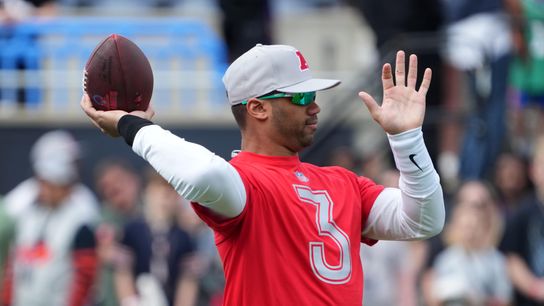Plans for the 2028 Olympics in Los Angeles continue unfolding, as the Los Angeles Times reported Wednesday that BMO Stadium will host flag football and lacrosse. The Rose Bowl will be the host venue for men's and women's soccer, SoFi Stadium will host swimming, and LA Coliseum will host track and field (the third time for that venue), leaving the 22,000-seat home of LA's men's and women's pro soccer teams in the Exposition Park neighborhood of Los Angeles to host flag football's Olympic debut, as well as lacrosse as that sport makes its first Olympics appearance since 1908.
In relaying that news to his audience, Mike Florio wrote this for ProFootballTalk:
The biggest lingering question regarding Olympic flag football relates to whether NFL players will participate. From trials to the competition, it introduces an injury risk that owners might not be willing to accept. And with plenty of recently-retired NFL players surely interested in another moment in the sun and/or the pursuit of Olympic gold, the best approach could be to tell current NFL players they should table their flag-football aspirations until their tackle football careers have ended.
With all due respect, Mr. Florio, bringing back recently-retired players while leaving active players at home is a terrible idea.
It's no secret that the NFL is hoping LA 2028 does for its sport what Barcelona 1992 did for the NBA and the game of basketball, and 1992 was only the smashing success as its was because the best players alive participated. It's not an exaggeration to say the sport of basketball might be in a different place today if Michael Jordan stayed home in favor of a 42-year-old Julius Erving. Recognizing the opportunity for what it was, the NBA made sending Jordan and company to Barcelona a top priority, and it's not clear if Chicago Bulls owner Jerry Reinsdorf could've stopped Jordan from playing even if he'd wanted to.
Seeing professional athletes put their teams aside and compete for their respective countries is the height of sporting competition. In fact, one could even argue that domestic professional leagues are something the world's best athletes do to keep them busy between international competitions. Why else is the World Cup is the biggest sporting event in the globe? Locally, the NHL's 4Nations Face-Off was a bigger hit than the actual Stanley Cup Finals, an event more than worth the trouble of pausing the regular season for two weeks in February. The NHL has also committed to sending its players to the 2026 and 2030 Winter Olympics. The tri-annual World Baseball Classic has been a success for Major League Baseball, easily worth the disruption to spring training. The NBA is still sending its best to compete in the Olympics; the 2024 gold medal game vs. France drew more viewers than any game in the last seven NBA Finals.
Holding active players out of the 2028 Olympics out of some misguided fear of injury or training camp disruption would be the definition of penny wise, pound foolish. To speak bluntly, the exposure generated from sending the best-of-the-best to the 2028 Olympics is so beyond worth the possibility of the Cincinnati Bengals missing a Ja'Marr Chase season to a torn ACL or the distraction of the Kansas City Chiefs enduring a few training camp weeks without Patrick Mahomes that Roger Goodell should insist on sending the 2027 First Team All-Pros to LA, owners be damned.
And that's another thing. There's no guarantee that the best of the NFL's best in 2024 will still be the best by 2028. In a sport that increasingly leans into water-cooler conversation fodder, the jockeying to get onto the 2028 US roster would be an endless wellspring of content for the next three years, at minimum. Is Mahomes still going to be The Guy by summer 2028? Is Ohio State's Jeremiah Smith good enough to play his way onto the team right now? Will Arch Manning have enough juice to be on the 2028 squad, or would he have to wait it out for 2032? That's next on First Take...
Seriously, the recruiting process and the NFL Draft Industrial Complex have turned every football fan into an arm chair general manager, and the process of choosing The First True All-American Team would be just as valuable to the NFL as the Games themselves.
Finally, let's take one step back here. Having fully conquered American males, the NFL's biggest priority is selling its product to two largely untapped markets: American women, and the international market. The 2028 Olympics represent the intersection of those two goals. Generally speaking, only young men aged 8-to-28 can play tackle football. Aside from the obvious reasons why, it takes a lot of equipment to play tackle football, and hours upon hours of training to do it safely. But anyone can play flag (or touch) football. LA 2028 is different than Barcelona 1992 in that we're not literally exporting our game overseas, but it's still the biggest global stage football has ever been on. I've written previously about how LA 2028 plays into the NFL's biggest priority, which is getting flag football into the 2023 Olympic Games in Brisbane. The NFL is also exploring the possibility of launching its own pro flag football league, with divisions for men and women. And I just don't see either happening by putting the Past Their Prime Stars of Yesteryear into the Olympic spotlight in 2028.
I don't mean to pick on Florio here. He's connected as it gets in the NFL world, so it's not clear whether he's trial-ballooning the hopes and/or wishes of NFL ownership or simply sharing an off-the-cuff opinion. Either way, I want to stop that line of thinking in its tracks.
Putting active stars in the 2028 Olympics would not come without risks or headaches, but it's still such an obvious slam-dunk idea for the NFL that I can't believe the league would seriously think otherwise.
